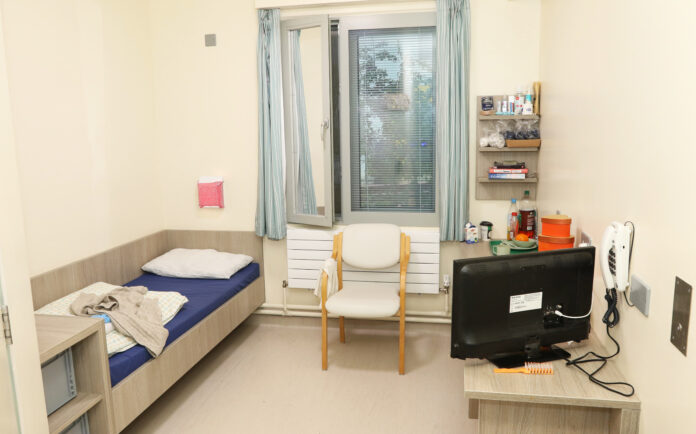
WOMEN prisoners, including those convicted of murder, are being housed in comfortable new bedroom units and “deluxe” style apartments following a multi-million euro rebuild of Limerick Women’s Prison.
The new women’s prison, located in the Mulgrave Street prison complex, was officially opened on Wednesday (October 18) by Minister for Justice Helen McEntee. It includes a dedicated mother and baby space allowing pregnant prisoners and new mothers to spend up to a maximum of 12 months bonding together inside the prison.
The state of the art new prison will also be available to transgender women prisoners who qualify for accommodation after risk assessments are carried out to ensure the safety of all prisoners and prison staff.
Staff at the prison’s accommodation, which can house a maximum of 56 prisoners, no longer refer to the units as ‘cells’ in what Limerick Prison Governor Mark Kennedy described as a “trauma-informed care” approach based on the principle of rehabilitation and normalisation reflecting contemporary design standards.
All female prisoner “rooms” come with a host of mod con facilities including en suite bathrooms, television, and telephone – all telephone calls in and out of the rooms are digitally recorded (apart from calls between prisoners and their legal representatives) for security reasons.
Prisoners can also avail of a new gymnasium, education courses, and one-on-one psychological counselling sessions, based on best practises in female prisons across the UK and Scandinavia.
Mr Kennedy said his focus was on ensuring women prisoners feel safe while serving their sentences in Limerick, “because the vast majority of female prisoners we get come from a background of domestic violence, sexual violence, and coercive control”.
The care centred build is, Mr Kennedy said, “the perfect design for female prisoners, in that it’s a cheaper build than the securitisation” normally seen in secure male prisons.
“With this build we recognised that we don’t have to have hard security for all prisoners, and if we have the wrap-around services inside and we link with the community outside, that’s a better service for us and that will stop the cycle of recidivism,” offered Mr Kennedy.
Asked if the plush prison would also help rehabilitate long-term prisoners, including those serving life sentences for murder, the Limerick prison governor replied: “Of course they can (be rehabilitated) because murder is normally a once-off offence and it’s usually brought around by a certain amount of emotions.”
“We’ve viewed the female prisoners here, both long term and short term, have had trauma in their lives, so before the crime was committed – I’d say it’s nearly 95 per cent – there has been sexual violence, physical violence, coercive control. There’s always a man in the background pulling the strings, and they (the women) end up in prison.
“All of the prisoners in Limerick Prison are going to get out at some stage. They are going to be sitting beside you on the Green Bus or the LUAS out to Dublin Airport going on holidays.
“So, if we don’t do our job right, and we just lock them up and through away the key, we are aren’t sending out a different person who is rehabilitated and more rounded.”
“We have 350 prisoners (female and male) here today, all of them are going to get out at some stage, so the government have put the duty on me here in Limerick to make sure that we do the best we can with them inside the prison to leave them out into the community.”
When asked about the prison’s policy around transgender women prisoners serving time inside the women’s prison, Mr Kennedy explained that “no matter what gender they are or what they identify” as, each prisoner is subject to “a number of risk assessments, including medical and security risk assessments” to ensure the safety of the entire prison population.
At least one violent transgender woman prisoner has previously been accommodated in the Limerick Women’s prison, sparking protests outside the jail.
Barbie Kardashian, who was convicted of threatening to rape and kill her mother, and who a court heard has a predilection for harming women, was moved out of the general female prison population in Limerick and is currently sharing a wing with accused wife killer Richard Satchwell and former Dublin Sinn Féin councillor and gangland supergrass Jonathon Dowdall.
Minister for Justice Helen McEntee did not specifically deal with questioning from reporters who asked if she would personally feel comfortable sharing space in the prison with a violent transgender women prisoner.
Minister McEntee replied: “Where prisoners go is very much a matter for the presiding judge, it’s not a decision that I as minster nor the prison service make.”
“What is most important in the approach that the prison service takes is that every person is safe, no matter who they are, no matter what their gender is, and that is an assessment that is made when a person is being sent to prison.
“So, it is really important that, irrespective of who it is, they are sent to the place that is appropriate for them, ensuring their safety but ensuring the safety of others as well, and that’s what I would expect if I were to be in that scenario, and I think that’s what anybody would expect.”









